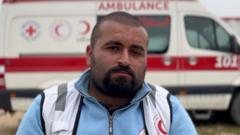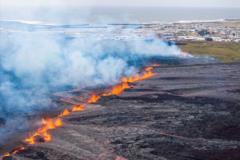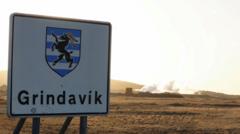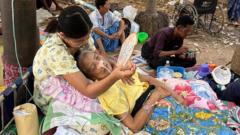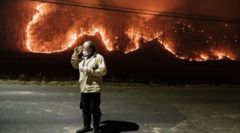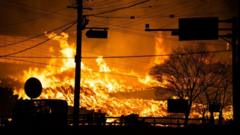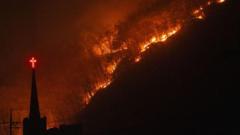**Santorini, once bustling with both locals and tourists, is now a quiet island as over 80% of its residents leave due to fears of ongoing earthquakes, highlighting the unpredictable nature of seismic activity and its social implications.**
**Tsunami of Tremors: Santorini Faces Unprecedented Earthquake Activity**

**Tsunami of Tremors: Santorini Faces Unprecedented Earthquake Activity**
**A surge of seismic activity leads to exodus of residents from Greece's iconic tourist island.**
In recent weeks, Santorini, a renowned Greek island famous for its stunning views and vibrant tourism, has been rocked by an alarming series of earthquakes. February, typically a slow month for tourism, has transformed the island into a ghost town as over 13,000 of its 15,500 residents have chosen to evacuate amidst fears stemming from thousands of minor tremors occurring almost continuously since January 25.
The seismic upheaval reached a critical moment when a magnitude-5.2 earthquake struck northeast of the island last Wednesday, causing not only palpable fear among locals but also felt in Athens, approximately 150 miles away. While many tremors have been small, the unprecedented frequency—160 tremors of magnitude 4 or higher in the first nine days of February alone—signifies an unusual and concerning outbreak of seismic activity compared to averages from previous years.
The future of the island remains uncertain, according to experts like Vassilis Karastathis, director of the Institute of Geodynamics at the National Observatory of Athens. He explains that although some stabilization signs can be observed, predicting the longevity and intensity of the eruptive events proves difficult. The ongoing tremors, although seemingly minor, have created an atmosphere of anxiety. Most residents have fled, leading to nearly deserted streets with only a few persevering tourists remaining, primarily from Asia.
Given the potential danger, local authorities have implemented safety measures, including the closure of schools and cancellation of large indoor events. Emergency services are on standby, prepared for potential evacuations, as specific areas have been cordoned off due to risks of landslides. Psychological support services have been deployed to offer counseling to the anxious residents, further demonstrating the social implications of such natural events.
In summation, Santorini's current situation reflects not just natural geological phenomena but the profound impact such disasters can have on human life, community resilience, and economic stability in the realm of tourism. As residents navigate uncertainty, the broader implications for other vulnerable regions remain a pressing concern.
The seismic upheaval reached a critical moment when a magnitude-5.2 earthquake struck northeast of the island last Wednesday, causing not only palpable fear among locals but also felt in Athens, approximately 150 miles away. While many tremors have been small, the unprecedented frequency—160 tremors of magnitude 4 or higher in the first nine days of February alone—signifies an unusual and concerning outbreak of seismic activity compared to averages from previous years.
The future of the island remains uncertain, according to experts like Vassilis Karastathis, director of the Institute of Geodynamics at the National Observatory of Athens. He explains that although some stabilization signs can be observed, predicting the longevity and intensity of the eruptive events proves difficult. The ongoing tremors, although seemingly minor, have created an atmosphere of anxiety. Most residents have fled, leading to nearly deserted streets with only a few persevering tourists remaining, primarily from Asia.
Given the potential danger, local authorities have implemented safety measures, including the closure of schools and cancellation of large indoor events. Emergency services are on standby, prepared for potential evacuations, as specific areas have been cordoned off due to risks of landslides. Psychological support services have been deployed to offer counseling to the anxious residents, further demonstrating the social implications of such natural events.
In summation, Santorini's current situation reflects not just natural geological phenomena but the profound impact such disasters can have on human life, community resilience, and economic stability in the realm of tourism. As residents navigate uncertainty, the broader implications for other vulnerable regions remain a pressing concern.









